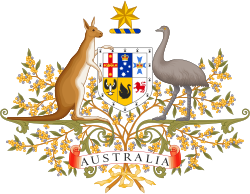Muschinski v Dodds
Muschinski v Dodds,[1] was a significant Australian court case, decided by the High Court of Australia on 6 December 1985. The case was part of a trend of High Court decisions to impose a constructive trust where it would be unconscionable for a legal owner of property to deny the beneficial interests of another.[2] In this case the Court held it would be unconscionable for Mr Dodds to retain a half share of the property without first accounting for the purchase price paid by Ms Muschinski.[1]
| Muschinski v Dodds | |
|---|---|
 | |
| Court | High Court of Australia |
| Decided | 6 December 1985 |
| Citation(s) | [1985] HCA 78, (1985) 160 CLR 583 |
| Case history | |
| Prior action(s) | (1982) 8 Fam LR 622 |
| Appealed from | NSW Court of Appeal |
| Case opinions | |
| Majority | Gibbs CJ, Mason & Deane JJ |
| Dissent | Brennan & Dawson JJ |
Background
Facts
Ms Muschinski and Mr Dodds were in a de facto relationship. In 1976 they purchased a property in Picton as tenants in common, intending to develop and use the property. Ms Muschinski paid the purchase price while Mr Dodds was going to renovate the cottage and to pay for a kit house. The development did not go ahead and the couple separated.[2]
Prior actions
Ms Muschinski commenced proceedings in the Supreme Court of NSW seeking a declaration that she was the sole owner. Mr Dodds made a cross claim for the property to be sold and the proceeds to be divided equally. Waddell J dismissed Ms Muschinski's claim and stood the matter over to determine Mr Dodds' cross claim. Ms Muschinski appealed to the NSW Court of Appeal who dismissed the appeal. Hope JA, with whom Samuels and Mahoney JJA agreed, said:
I agree with his Honour's conclusion that (Ms Muschinski) intended to give (Mr Dodds) a one-half beneficial interest in the land, and that this intention was based on the assurances which (Mr Dodds) gave to her and not upon the fulfilment of those assurances.[3]
Judgment
The High Court of Australia found in favour of Ms Muschinski. The majority, Gibbs CJ, Mason & Deane JJ, held that the legal interests of the parties were subject to a constructive trust to (1) repayment any joint debts (2) repay each of their contributions and (3) any residue was to be distributed in equal shares.[1][2]
Brennan & Dawson JJ dissented.
See also
Cases Referring to this Case
Cases Considered by this Case
References
- Muschinski v Dodds [1985] HCA 78, (1985) 160 CLR 583 (6 December 1985), High Court (Australia).
- Hepburn, S (28 February 2006). Australian Principles of Property Law. Cavendish Publishing. ISBN 9781843142232. Retrieved 19 June 2015.
- Muschinski v Dodds (1982) 8 Fam LR 622 at p 627, NSW Court of Appeal.
- Baumgartner v Baumgartner [1987] HCA 59, (1987) 164 CLR 137 (10 December 1987), High Court (Australia).
- Farah Constructions Pty Ltd v Say-Dee Pty Ltd [2007] HCA 22, (2007) 230 CLR 89 (24 May 2007), High Court (Australia).
- Commercial Bank of Australia Ltd v Amadio [1983] HCA 14, (1983) 151 CLR 447 (12 May 1983), High Court (Australia).